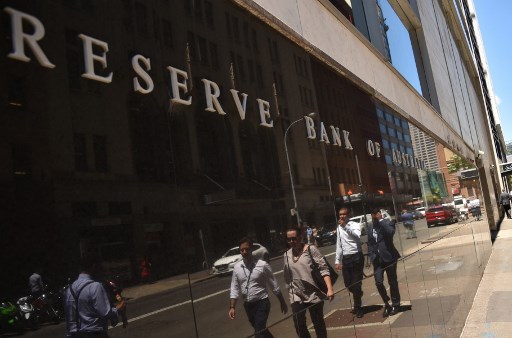
Australia’s central bank kept interest rates at a record low in its first meeting of the year on February 6 amid a soft inflation environment and an uncertain outlook for household spending. / AFP PHOTO
SYDNEY, Australia (AFP) — Australia’s central bank on Tuesday kept interest rates at a record low in its first meeting of the year, with inflation still soft and the outlook for household spending uncertain.
The Reserve Bank of Australia has not adjusted rates since August 2016, following a series of cuts from November 2011 that took it to 1.50 percent in a bid to boost non-mining sectors of the economy.
Governor Philip Lowe said in a statement that the current monetary policy stance was supporting economic growth.
“The low level of interest rates is continuing to support the Australian economy,” he said after the RBA board meeting.
“Further progress in reducing unemployment and having inflation return to target is expected, although this progress is likely to be gradual.”
The economy has endured a bumpy exit from an unprecedented resources investment boom, but recent data has pointed to a strengthening labour market and business investment.
Even so, wages growth remains weak while household debt is high, keeping the central bank on the sidelines with economists tipping a possible rate rise only later this year.
“One continuing source of uncertainty is the outlook for household consumption. Household incomes are growing slowly and debt levels are high,” Lowe said.
“Notwithstanding the improving labour market, wage growth remains low.”
Another concern has been the strength of the Australian dollar owing to weakness in the greenback, with the RBA reiterating that an appreciating exchange rate could slow growth in economic activity and inflation.
Underlying or core inflation — which strips out volatile items and is closely watched by the central bank — is at an annual 1.9 percent, just below the RBA’s target band of 2.0-3.0 percent.
Lowe added that the bank expected consumer prices to remain low for some time, “reflecting low growth in labour costs and strong competition in retailing”.
“A gradual pick-up in inflation is, however, expected as the economy strengthens,” he added.
JP Morgan interest rate strategist Henry St John told AFP that weak inflation forecasts and below-trend growth weighed on the normalisation of monetary policy in the near-term.
“Inflation outcomes have remained weak … alongside that we continue to see growth outcomes as below trend,” he said.
“So on the basis of that as well as financial stability issues around household balance sheets, we see little prospects for the RBA to move rates over this year.”
© Agence France-Presse







